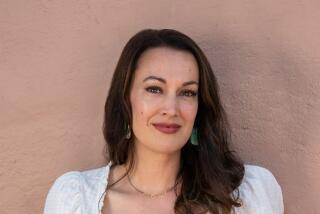Life throws a few curves in Michelle Huneven’s ‘Off Course’
- Share via
Call it the Big Swerve: That point in one’s adult life where decisions about the future — marriage, career, kids, mortgage payments — have to be reckoned with. It creeps up on us with little warning. Tramping our merry way through the marigolds of our youth, we suddenly encounter a crossroads. Priorities have to be straightened out, in a hurry. We all seem to be intent on not swerving in the wrong direction; one false move might send us down a rabbit hole of disappointment and regret that we will have great difficulty crawling out of.
Michelle Huneven, a longtime L.A.-based writer whose prior novels limn the jagged paths of troubled misfits and outsiders, has created a protagonist in her fourth novel, “Off Course,” who seems to be stuck in neutral or else unwilling to tread the path so neatly laid out before her. Unwilling, in other words, to swerve in any functional direction.
Cressida Hartley is a 28-year-old doctoral candidate in economics, struggling to finish her thesis and pondering the unappealing career options her degree might confer, trying desperately not to become “one of the aging lurkers around the Econ Department who hoped for sections of Intro to teach while the tenure track shimmered eternally on the far side of two hundred pages.”
She’s in a holding pattern and figures the surest solution for getting off the dime is a change of scenery. Her parents have an A-frame up in the Sierra, and Cress avails herself of the house for a short respite while keeping on an eye on the construction of a new house her parents are building nearby. “Off Course” is all about what happens when Cress decides not to leave.
Shedding the hothouse, hyper-educated atmosphere of academe, Cress enters into a closed ecosystem of manual workers, their wives and lovers — men and women who work with their hands and try to not let any domestic discord leak out into the greater gossip pool of their small-town life. Idealizing this rural lifestyle from the outset, Cress thinks she has found the solution to her problems — a break from the careerist and pinched circumstances of her real life in Los Angeles.
It’s a kind of dreamland in reverse — a place with no real attractions for an outsider except the gift of anonymity and reinvention. Hoping for time to reflect, Cress instead finds herself in a relationship with lodge-owner Jakey Yates, a man 19 years her senior whose relaxed disposition and unselfconscious solicitude ignites some dormant corner of Cress’ heart. It doesn’t go well, so Cress doubles down and falls into something more serious with Quinn, a married carpenter.
All the while Cress keeps calibrating her options against their real consequences. Should she stay with Quinn, who vows to leave his wife and start anew with her, or should she skip off to Minneapolis, where her former boyfriend, another academic, resides and is willing to take her back? The choice is vexing: Quinn is empathetic and forthright, a man’s man of sorts who doesn’t play games and has no truck with ambivalence, the inverse of Cress’ L.A. crowd, who go to therapy and are forever taking their own emotional temperature.
Cress knows she would miss Quinn’s “low voice, the reliable pressure of his physical presence. His own tincture of sawdust and bad cologne.” Cress thought she had left the hard decisions behind her in Los Angeles; instead she is being forced back into the Big Swerve.
Huneven, a writer of great empathy and emotional precision, doesn’t resort to cheap moralizing here. Such easy lessons would give this gracefully written novel the harsh sting of a cheap, cautionary tale. Instead, she lets her characters play out their scenarios like real adults must — weighing the pleasures of the present against their own future guilt, as well as the recriminatory blowback of a tight-knit community that seems to have a double standard when it comes to interlopers getting involved with one of their own.
What Huneven so skillfully points out here is that love triangles, torrid affairs and the like are not just reserved for protagonists in Jackie Collins airplane novels. Even the most evolved among us can fall prey, as does Cress, to the allure of rough sex with the wrong person in the back of a dirty pickup.
By the conclusion of this finely wrought novel, Cress has found some measure of peace. There has been wreckage left behind, but as often happens the passage of time settles things. It’s just a rocky passage is all.
Weingarten is working on a book about L.A.’s water wars.
Off Course
A novel
Michelle Huneven
Sara Crichton/Farrar, Straus & Giroux: 304 pp., $26
More to Read
Sign up for our Book Club newsletter
Get the latest news, events and more from the Los Angeles Times Book Club, and help us get L.A. reading and talking.
You may occasionally receive promotional content from the Los Angeles Times.










